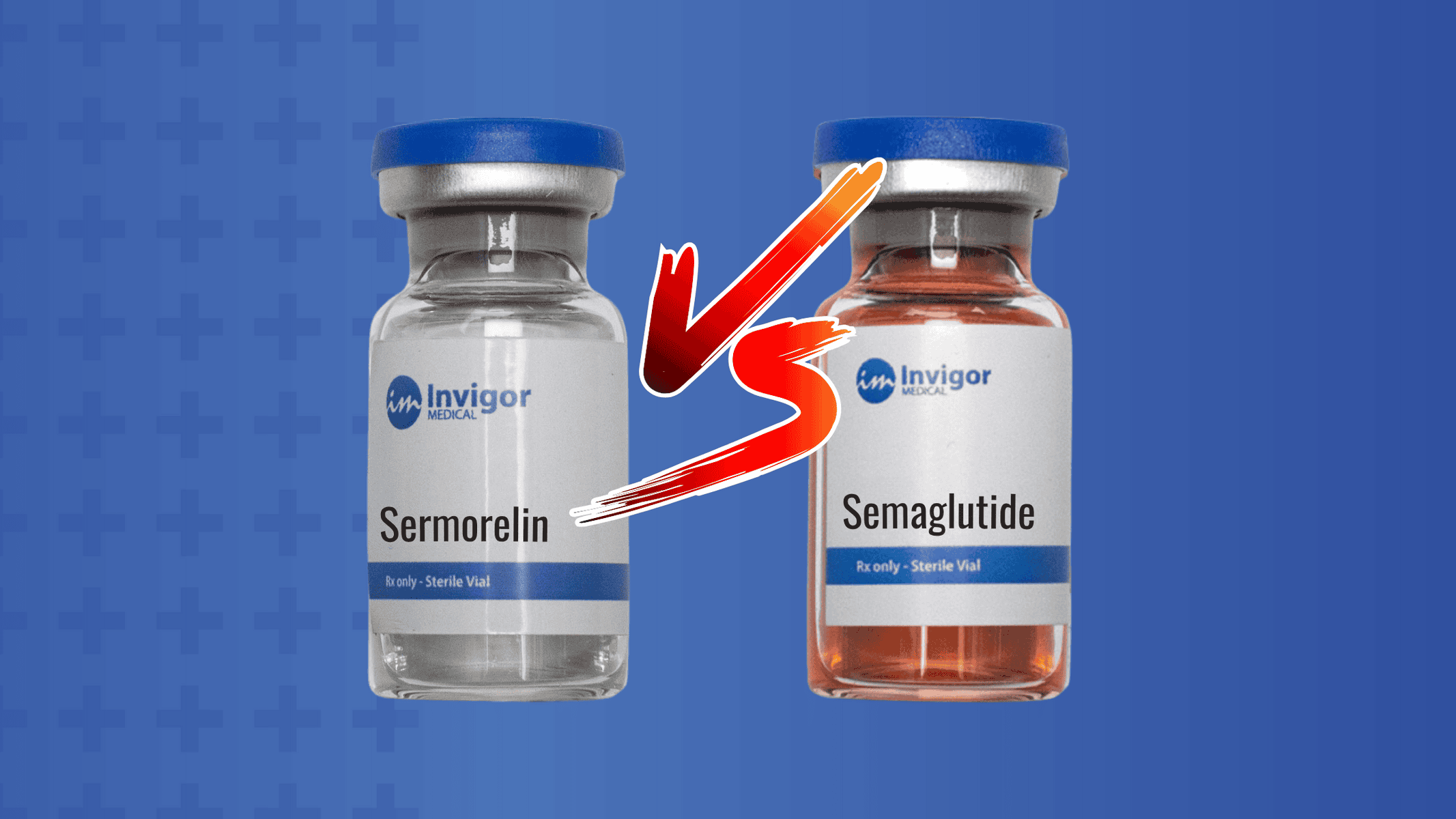Semaglutide and phentermine are both medications used for weight loss. They do not interact and can potentially be used together as part of a weight-loss regimen. A 2022 article in the journal Australian Prescriber listed semaglutide and phentermine as substances that could work together. However, the combination could increase the risk and number of side effects or interact with other medications you might be taking.
Whenever combining medications, you should consult a physician and monitor your intake to check for effectiveness and side effects. Here is a closer look at semaglutide and phentermine and the factors you should consider if you plan to take them together.
Table of Contents
What Is Semaglutide?
Semaglutide is a glucagon-like peptide-1 (GLP-1) receptor agonist. This means it mimics the GLP-1 hormone, which regulates blood sugar and appetite.
A doctor may use semaglutide as part of a weight loss regimen that could include other substances, such as B12 with lipotropic compounds, which can enhance fat metabolism.
A calorie deficit — or consuming fewer calories than you burn through exercise and daily bodily functions — is essential for weight loss. The main advantage of semaglutide is that it suppresses your appetite, making it easier to consume fewer calories without feeling hungry.
While the medication makes it easy to maintain a calorie deficit, it can expose you to short- and long-term side effects. Acute side effects might include:
- Digestive problems like diarrhea and nausea
- Headaches
- Heartburn
- Fatigue
Long-term use can expose you to a risk of the following health problems:
- Gallbladder problems
- Thyroid tumors
- Pancreatitis
- Kidney disease
The most common problem with semaglutide is the rebound weight gain that many people experience when they stop taking the medication.
Your bank account can also feel the effects. The average cost for oral and injectable semaglutide is $935 per month. Since treatments last for multiple months, the cost can be quite high unless you find a reasonably priced source.
What Is Phentermine?
Phentermine is another medication approved for weight loss. Like semaglutide, it suppresses your appetite. However, it does not mimic hormones. Instead, it is an anorectic, a class of medicines that stimulate the area of the brain that controls appetite.
Phentermine can be effective for short-term use, and it is a popular option for weight loss. However, it is a stimulant, so it can expose you to different side effects than semaglutide. Here are some of the possible issues you may encounter:
- Heavy or fluttering heartbeats
- Shortness of breath
- Insomnia
- Stomach pains
- Dry mouth
- Dizziness
Phentermine may be habit-forming, so it’s generally for short-term use. Several brands and generic options are available, so it may be more accessible than semaglutide.

Semaglutide vs. Phentermine
There are similarities between semaglutide injections and phentermine. They promote weight loss with appetite suppression, making the most effective weight-loss approach, maintaining a calorie deficit, easier. However, the method each uses for appetite suppression is different, as are some of the side effects, and the original purpose of the drug.
Semaglutide works for weight loss in non-diabetic people, but it was originally approved to help people with diabetes control their blood sugar levels by spurring insulin production. Phentermine was first developed as a weight-loss medication that could replace amphetamines.
Semaglutide impersonates GLP-1 hormones, which tell your body that you have eaten and can now start burning energy. A high amount of GLP-1 sends signals that you are already full and have enough food to convert to energy.
Phentermine influences the hypothalamus, which is the part of the brain that affects metabolism and appetite. It also releases epinephrine, better known as adrenaline, which increases heart rate and improves metabolism.
Both medications can cause digestive tract side effects, but phentermine’s stimulant properties can also cause high blood pressure and other heart issues. Meanwhile, semaglutide can impact the pancreas, kidneys, and gallbladder.

Semaglutide Medication Interactions With Phentermine
While some physicians use semaglutide and phentermine together, there is a potential for interactions.
- Both medications can cause dizziness, headaches, nausea, and diarrhea. Together, these side effects may get compounded.
- Phentermine can cause nervousness and insomnia, which could potentially cause side effects like anxiety, which is rare but possible in semaglutide users.
- Both medications may lose their effectiveness as you build up a tolerance. This usually happens to phentermine first, meaning weight loss could slow, even if you continue semaglutide.
Also, you should be aware of possible rebound weight gain after stopping one or both of the medications. It is necessary to taper off doses and adopt lifestyle practices that help you keep the weight off.
Weight Loss Results
Semaglutide leads to longer-term weight loss. One study published in the Journal of American Medicine (JAMA) Network found that semaglutide users lost 10.9% of their body weight in six months of use. Another study in Drug Design, Development, and Therapy found an average weight loss of 9.6 to 17.4% of initial body weight after 68 weeks.
Phentermine use can result in weight loss of 5 to 10% of initial body weight over 12 weeks. There are no conclusive studies on the effectiveness of using both medications simultaneously, with most research focused on one or the other.

Other Benefits
There could be a few additional benefits from using both these medications together. Here are three of the largest advantages.
- It may take four or five weeks for semaglutide effects to become obvious. Daily phentermine can bring faster results while you wait for the injections to start producing results.
- Using phentermine after a course of semaglutide can protect you from the common problem of rebound weight gain.
- Phentermine is widely available and comes in generic forms, allowing you to keep taking weight loss medication during a semaglutide shortage.
A doctor can help you plan doses and treatment schedules to maximize the weight loss benefits of both products.
Is Semaglutide or Phentermine More Effective?
Comparing weight loss medications including semaglutide and phentermine, the Journal of Managed Care found that semaglutide provided the best weight-loss results over the course of a year. The average patient lost 13.7% of their initial body weight after one year with semaglutide and 9% with phentermine (combined with topiramate).
When To Talk to a Doctor
Since both medications require a prescription, you will need to speak with your doctor before you start using either. During the treatment period, you should talk to your doctor if you start experiencing the following:
- Side effects that are more severe than expected
- Increased appetite or a lack of weight loss
- Unusual or unexpected side effects
- Pain or discomfort strong enough to disrupt your daily activities
Semaglutide and phentermine can facilitate weight loss when used together. Before beginning a course of this drug combination, you should consider side effects and talk with your doctor about doses, timing, and potential interactions.










